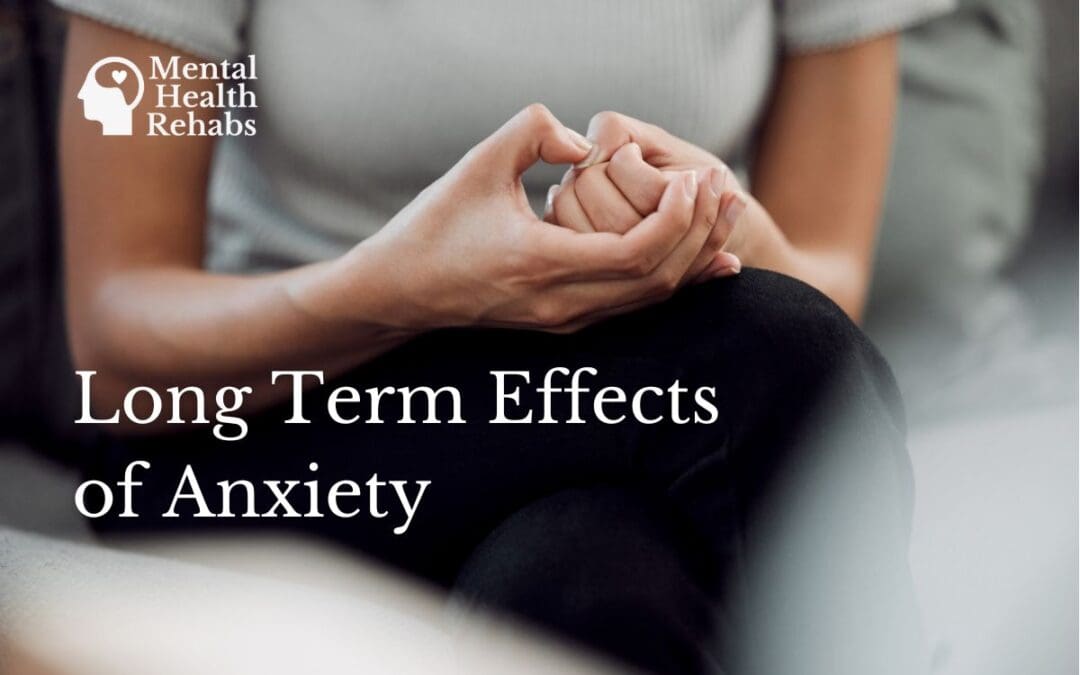It’s normal for people to feel anxious from time to time, but clinically diagnosed anxiety can be immensely disruptive to a person’s life and have far-reaching—and sometimes permanent —impacts on physical and psychological well-being.
3 Long-Term Physical Effects of Anxiety
Anxiety may be a mental health condition but it results in a serious physiological response that takes quite a toll on the body. When a person feels anxious the body kicks into fight-or-flight mode:
- Blood pumps harder and faster to prepare the muscles for action and is diverted from functions of digestion and tissue repair
- The stress hormone cortisol is released, switching the chemical cocktail in the brain from rational decision-making to being high alert (and isn’t always rational)
- Breathing is sped up to increase oxygen intake (but can end up constricting airways)
- Muscles tense as a way to brace for pending impact
Prolonged anxiety means these symptoms happen more frequently than is normal, and put a tremendous amount of stress on the body.
Poor heart health
One of the most notable long-term effects of anxiety is that of damage to the cardiovascular system.
Frequent increases in anxiety-induced blood pressure can result in damage to the lining of blood vessels. This heightens the risk of high blood pressure (hypertension), which can lead to an increased risk of heart disease.
These fluctuations can also result in irregular heart rhythms (arrhythmias) which can exacerbate existing heart issues as well as contribute to the risk of blood clots and strokes.
Lastly, chronic anxiety can cause arteries to contract to such a degree they cut off blood flow to the heart. This is temporary. What’s not temporary is the potential heart failure this can ultimately result in.
Impaired immune system
Anxiety does a number on the body’s immune system too. First, there’s cortisol’s suppressant effects on immune cells. This makes those cells, and thus the immune system as a whole, far less effective at detecting and fighting things like infection-causing pathogens or cancer cells.
Cortisol also stimulates the release of cytokines and free radicals. These cell-damaging molecules cause inflammation, which is dangerous because it can lead to tissue damage, autoimmune diseases, and a wide range of chronic illnesses in addition to interfering with normal tissue and organ function.
To make matters worse, chronic inflammation can affect the brain and nervous system, leading to symptoms that further exacerbate anxiety.
Gastrointestinal issues
Anxiety interrupts digestion by reducing blood flow to the organs involved in the digestive system. In addition to slowing digestion, this can cause muscle contractions in the intestines. Repeated disruptions can lead to long-term digestive problems like irritable bowel syndrome (IBS), inflammatory bowel disease (IBD), and Crohn’s disease.
The gut is home to an entire ecosystem of microorganisms that play vital roles in everything from mental health to autism to cancer. It also plays a starring role in the immune response. Anxiety can wreak havoc on the immune response by disturbing the microbiome’s delicate balance in various ways: altering intestinal mucus, disturbing nutrient absorption, and changing how gut bacteria behave.
3 Long-Term Mental Effects of Anxiety
Depression
Depression and anxiety are two of the most common mental illnesses in the world. They also have a tendency to co-occur, meaning both conditions are present at the same time. Anxiety itself does not directly cause depression (nor vice versa) but many of anxiety’s symptoms can heighten a person’s risk.
Once again, cortisol can be blamed. The stress hormone disrupts the brain’s natural chemistry. Repeated disruptions can result in long-lasting imbalances of mood-regulating neurochemicals like serotonin and dopamine. These imbalances are directly correlated with a number of mental illnesses such as schizophrenia, anxiety disorders, and depression.
Memory Impairment
Feeling anxious can mean your mind is constantly whirring and on high alert. With your brain otherwise preoccupied most of the time, that can leave you with little extra attention to spare or brain power. As a result, anxiety can make it difficult to process, encode, and retain new information, thus negatively impacting your memory
The good news is that anxiety doesn’t necessarily result in long-term memory loss (you’re not suddenly going to forget your mother’s birthday). However, experiences during periods of anxiety may be difficult to retrieve even later once your anxious episodes pass.
Reduced cognitive functioning
Closely related to memory is the ability to learn new things, so naturally, cognition is also affected by anxiety. A brain preoccupied with worry or running on emotional overload, is going to have limited bandwidth for processing new information, making decisions, and solving problems. Further, anxiety tends to negatively impact sleep and sleep deprivation is a notorious disrupter of cognitive function.
Anxiety’s effect on cognition isn’t ‘long-term’ in the sense that the impairment will last forever, but will likely require the help of a mental health professional to address and undo the various ways that anxiety affects the body and brain.
Don’t wait until you’re experiencing severe, long-term effects of anxiety before getting help. Talk to a mental health professional today, to keep yourself both psychologically and physically healthy.

